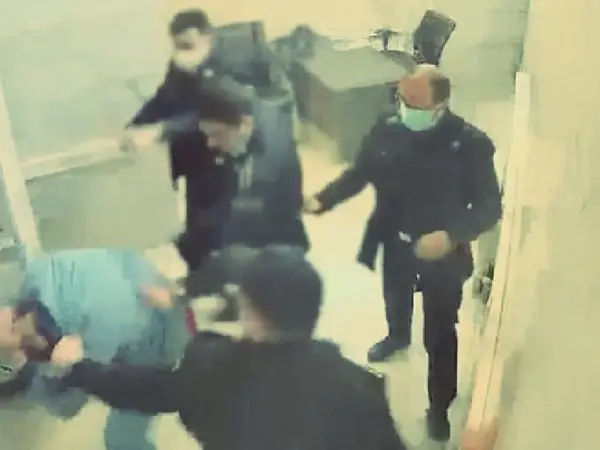In a move seen more as a public relations effort, the chief of Iran's judiciary has called on judges and prison wardens to respect the inmates' human dignity.
Gholam-Hossein Ejei made the call after Iranians as well as the international community saw pictures of Iranian poet and filmmaker Baktash Abtin with his feet chained to his hospital bed as he was dying of Covid-19. Abtin passed away on January 8 because prison wardens operating under Ejei’s command had delayed his medical treatment for at least 10 days.
Many other Iranian political prisoners have also ended up chained to hospital beds, but they were luckier than Abtin. Nonetheless, some of them developed problems such as kidney failure. Alireza Rajaei, a well-known intellectual and journalist lost part of his face because of neglect in prison.
Ejei particularly warned his colleagues not to use shackles on non-violent prisoners as if it was a new practice and he did not know about that before. Ejei has been holding top positions at the Iranian Judiciary throughout the past four decades, including Prosecutor of Tehran, and Prosecutor General at ordinary and revolutionary courts. Meanwhile, he is known for his hardliner positions regarding how to treat prisoners.
On Tuesday, the Iranian Prisons Organizations, which is a part of the Iranian Judiciary issued a long directive about how to handle matters relating to prisoners. Iranian media outlets such as moderate Aftab News have characterized the directive as a positive change.
A video broadcast by the Iran International TV last year showed prison wardens beating prisoners and dragging them on the floor in Evin prison's corridors. The Judiciary at the time removed the chief prison warden at Evin, but what happened to Abtin revealed that more changes were needed.
The new directive which includes 8 paragraphs, first defines the rights of inmates upon their arrival and then calls for respecting inmates' human dignity. It also calls for a medical and psychological assessment of the inmates upon their arrival. It also defines prisoners' rights in solitary confinement, which is a notorious method of torture against political prisoners in Iran.
In the new directive, solitary confinement is limited to 10 days for the first time and 15 days for the second time and applies only to violent inmates or those who break the law. Many Iranian political prisoners including former deputy interior minister Mostafa Tajzadeh have spent several months in solitary confinement.
The directive bans checking in inmates with acute illness and calls for free round-the-clock access to telephone within the first 48 hours of imprisonment so that the inmates could notify their lawyer and family of their situation.
Chief wardens are told to frequently visit new prisoners to make sure that they are familiar with their rights, and to put hygienic items, proper outfit, blankets and bank cards at the inmates' disposal. The cards allow inmates to shop their essential requirements at the prison shop.
The chief wardens also should facilitate contact with individuals who would bail out the prisoner or help them access the right kind of medical care they might need. Meanwhile they should record cases of assault and battery of the inmates by prison guards.
The directive particularly bans torture and discrimination based on sex, nature of accusations, and the inmates' financial status.
If the directive means that wardens were not committed to these principles until now, this could be the most incriminating document against the treatment of prisoners in Iran so far. It was the lack of such rules that led to many deaths in custody in Iranian prisons such as that of environmentalist Kavous Seyed Emami in 2018 and Iranian Canadian journalist Zahra Kazemi in 2003.
